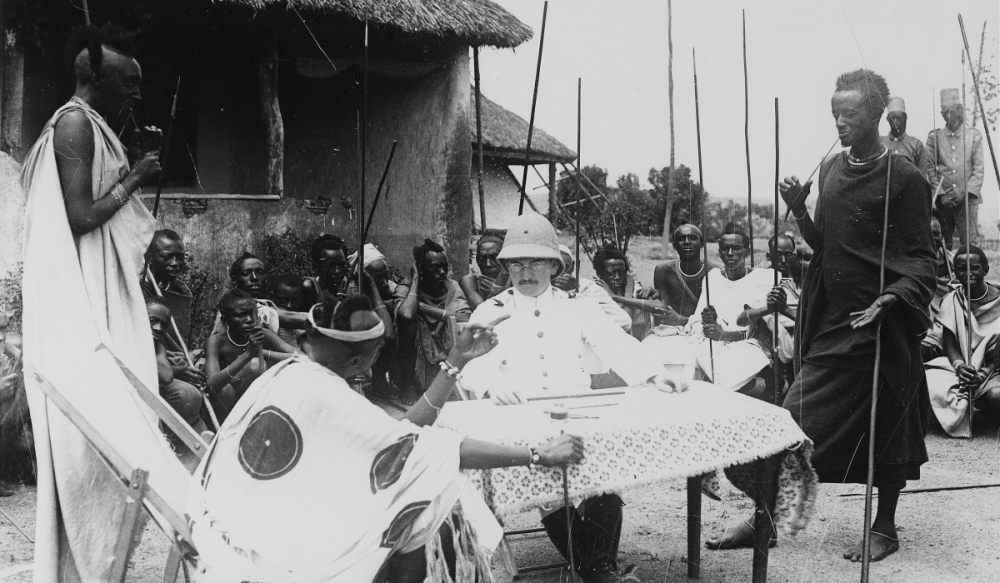

Yuhi V Musinga ascended to the throne at a young age, becoming a victim of circumstances beyond his control. The queen mother and her brothers were the de facto rulers of state affairs, undermining his authority.
This erosion of royal power worsened under colonial rule.
The Germans initially showed willingness to support Musinga, but this was undermined by the humiliation inflicted by one Von Beringe, who fined the king 40 cows following the alleged torture of a man named Mpumbika at the king’s court.
This marked the beginning of Musinga's complete loss of power.
The resolution of the Rucunshu saga did not quell the intrigue at the royal court. The victorious faction of Rucunshu engaged in fresh conflicts among themselves, illustrating the dialectical nature of power struggles.
Brothers Kabare and Ruhinankiko began infighting for control of the court, as demanded by the queen mother. This led to the Battle of Rwata near present-day Gahabo in Nyagatare District.
Amid the ongoing court intrigues, the Germans upheld the principles of natural borders and linguistic unity, which the Belgians disregarded.
Conferences held in European capitals resulted in Rwanda losing a third of its territory, with Rwandans sold out without their consent or knowledge.
Years of settling scores among factions at the royal court saw the resurgence of Basebya in northern Rwanda, alongside the emergence of Ndungutse in the same region.
Basebya and his followers terrorised the areas around the Rugezi marshland, stretching from present-day Gicumbi to Burera districts. They were eventually defeated by the Germans, armed with rifles.
World War I significantly altered the political landscape in Africa and Rwanda. In 1907, the Germans opened a school for the sons of chiefs in Nyanza, aiming to cultivate leaders who could read, write, and speak Swahili, the official language of German East Africa.
Unknown to the Rwandans, the Germans were training future soldiers for the impending conflict of World War I, incorporating military exercises and rifle handling into the curriculum.
The Nyanza court, aware of the Shangi affair, was hesitant to engage in a European war. When World War I erupted, the Germans began hostilities against the Belgians in the Belgian Congo and occupied Ijwi Island, requesting that Yuhi Musinga provide fighters.
There was reluctance among the Rwandan leaders to participate in a European conflict, leading to the decision to send fighters without appointing a Rwandan chief commander.
Members of the royal guard, formed from the Indengabaganizi and Iziruguru Companies, focused more on military training than academic lessons at Nyanza.
They were dispatched to the Gisenyi front at Bugoyi, where they were expected to distinguish themselves once real fighting commenced.
In 1916, Belgian forces launched an offensive. Colonel Olsen captured Nkombo Island, occupied Cyangugu (now part of Rusizi District), and advanced toward Kigali.
Concurrently, Colonel Molitor took a route through Uganda to Gatsibo (now Gatsibo District) on his way to Kigali. After overcoming the German camp at Gatsibo, he and his contingent occupied Kigali in May 1916.
In the post-World War I period, Rwanda faced the threat of further dismemberment. Thanks to Father Classe, the Vicar General under Bishop Hirth, a report in 1920 and a memorandum in 1921 informed the Belgian government of the drawbacks of the British-Belgian agreement regarding Rwanda.
Belgian troops from the Belgian Congo played a crucial role in defeating the Germans in East Africa. Following this, Rwanda and Burundi were placed under the King of Belgium as a mandate, stripping the king of his royal powers.
When Musinga opposed their decisions, he was deposed and deported to Kamembe in present-day Rusizi District.
In 1941, he was exiled to Moba in the Democratic Republic of Congo, where he ultimately died. The colonialists denied his son, King Mutara III Rudahigwa, the opportunity to give him a proper burial in Rwanda, and history records show that his remains were taken to Belgium.


